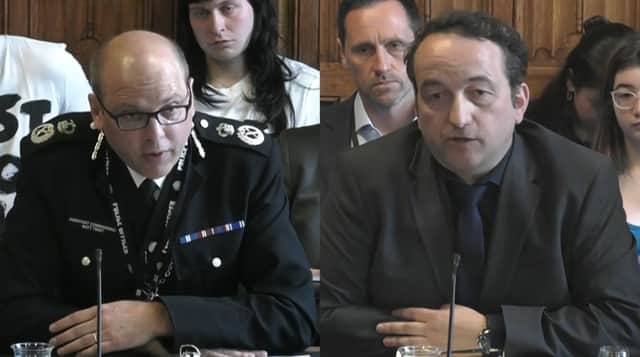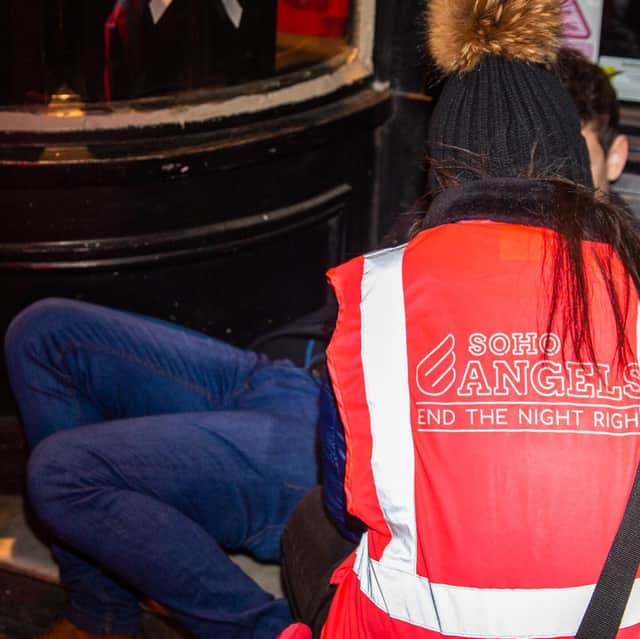Coronation: Republic had been ‘abundantly clear’ with Met Police about protest plans, says Graham Smith
and live on Freeview channel 276
Republic had been “abundantly clear” with the Metropolitan Police about its plans for anti-monarchy protests prior to the coronation, the group’s CEO Graham Smith has said.
The Met Police has faced significant backlash after it arrested a series of protesters from Republic, including Mr Smith himself, on the day of King Charles III’s coronation.
Advertisement
Hide AdAdvertisement
Hide AdThe force, which has since expressed “regret” over the incident, said at the time that officers believed the protesters had items which could be used to “lock-on” - now a jailable offence under the new Public Order Act.
But speaking at a Home Affairs Committee which was examining the police’s handling of the coronation, Mr Smith argued that the Met should have known Republic “never had any intention” of disrupting the coronation’s proceedings, as the group had been in discussion with the force about protest plans for “four months”.
He told MPs: “We told [the Met] how many placards we would have and what they would say on them. We told them we would have megaphones and amplifiers for the purpose of making speeches to the crowds. We told them exactly where we were going to be on the route.”


Mr Smith added that this information had been communicated to protest liaison officers via two in-person meetings, while other plans were discussed over “numerous” phone calls and email exchanges. “The Met Police were very clear with us that they did not have a single concern about anything we were going to do,” he added.
Advertisement
Hide AdAdvertisement
Hide AdThe activist even claimed that his arrest and subsequent 16-hour detainment, which he described as a “traumatic” experience, had “all the hallmarks of being premeditated” - as it appeared to him that police officers had turned up “with the intention” of remanding him into custody for the duration of the coronation.
Elsewhere in the committee meeting, Met Police chiefs were asked whether officers had been under political pressure “from above” when it came to how they handled anti-monarchy protesters on 6 May. Matt Twist, Temporary Assistant Commissioner for Met Operations, insisted he felt “no pressure politically” but instead felt “pressure to deliver a safe and secure operation”.
“But that was because,” he continued, “the coronation was a once-in-a-lifetime event for so many people and there were going to be hundreds of thousands of people in London to celebrate.” He added that the day was also the “biggest protection operation” the Met had ever run, with 312 protected people who the force “managed to get in and out of Westminster Abbey in about 90 minutes.”
Mr Twist was then questioned over whether he was “aware of his police duty to facilitate protests”. He said he, and other Met Police officers, were “very familiar” with their obligations in this area, but argued there is a “fine line between peaceful protest and what strays into illegal activity.”
Advertisement
Hide AdAdvertisement
Hide Ad“We are continually balancing the rights of those who seek to protest with those who are impacted by it,” he told the committee, before explaining that arrests are made after considering intent and the likelihood of people doing something like locking-on.
When told that there was no history of Republic using lock-on tactics - which is what protesters were arrested on suspicion of - Mr Twist argued that “officers have to make a difficult judgment at the time, in the moment, based on what they are faced with and based on the information they have.”
He continued: ”They were operating in a threat environment where they believed, taking into account the time, the location, and proximity to the route, that the [heavy-duty material straps] were items that could be used for locking-on.” Republic has said the straps were going to be used to secure placards.


Also present at the Home Affairs Committee was Suzie Melvin, a women’s safety volunteer for Westminster City Council, who was arrested in the early hours of 6 May alongside two colleagues on suspicion of conspiracy to commit public nuisance after officers found they were in possession of rape alarms.
Advertisement
Hide AdAdvertisement
Hide AdThe Met said it believed these were going to be used to “disrupt the procession” being held for King Charles III - possibly scaring the horses and causing “significant risk to the safety of the public and the riders”. Ms Melvin explained to MPs on the committee that ‘Night Star’ volunteers carry a number of items in their bags, including bottles of water, flip-flops, and spiking kits, which are all used in the interest of women’s safety.
Speaking about her arrest, Ms Melvin then claimed: ”I was informed by the officer who arrested me that they were specifically looking for the Night Stars and they had been told where we were going to be.”
There was also some drama in the meeting room, when a group of Just Stop Oil protesters attempted to disrupt the committee. There was some background noise on the livestream, an MP was heard saying “oh no, we’re not having this”, and then the feed cut out.
Committee chairwoman Dame Johnson later gave a statement on the interruption once the livestream was up and running again, remarking: “We take very seriously that Parliament should be open to members of the public. That is very important. But we also take very seriously that we should not be disrupted from our job of scrutinising these cases.”
Comment Guidelines
National World encourages reader discussion on our stories. User feedback, insights and back-and-forth exchanges add a rich layer of context to reporting. Please review our Community Guidelines before commenting.
